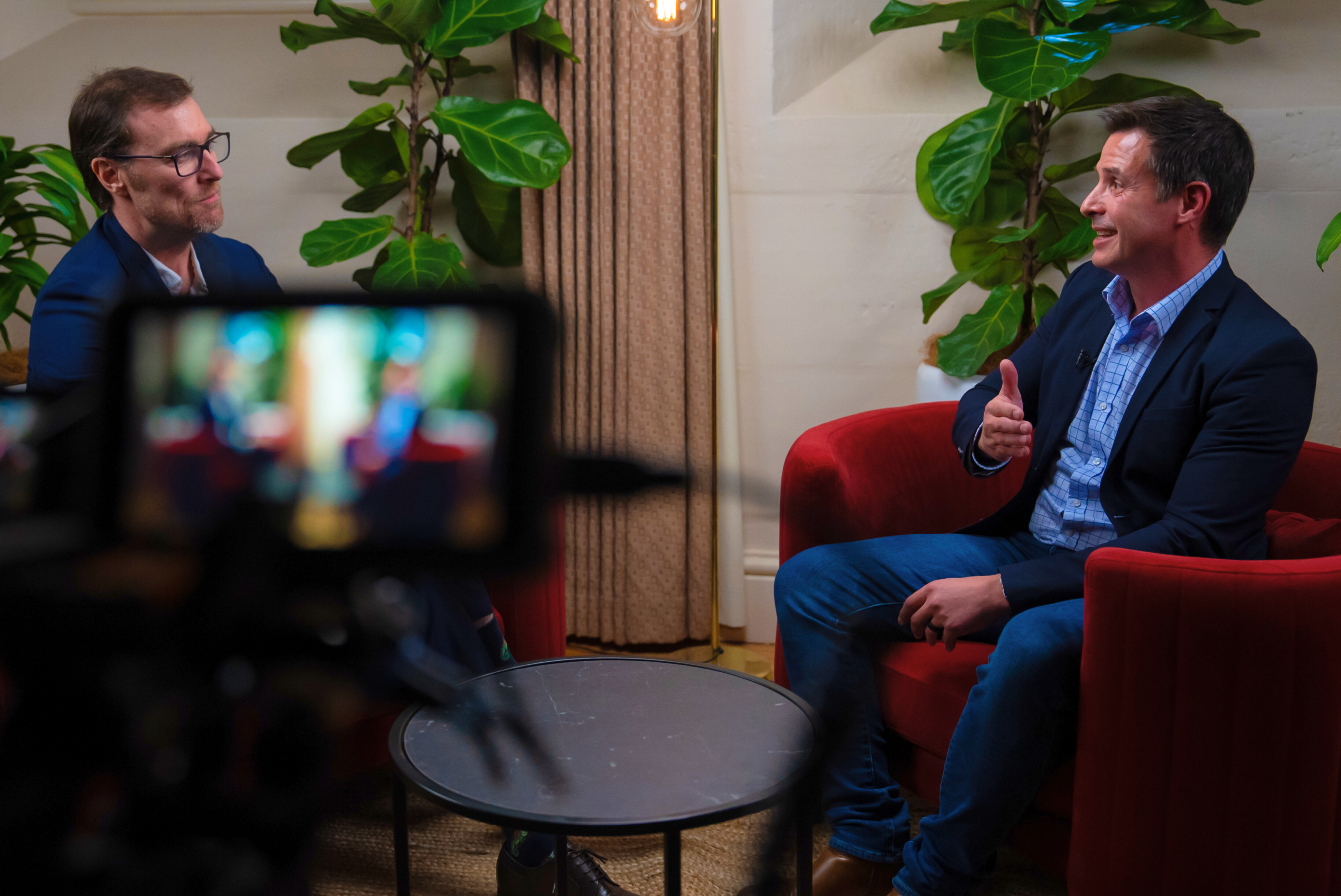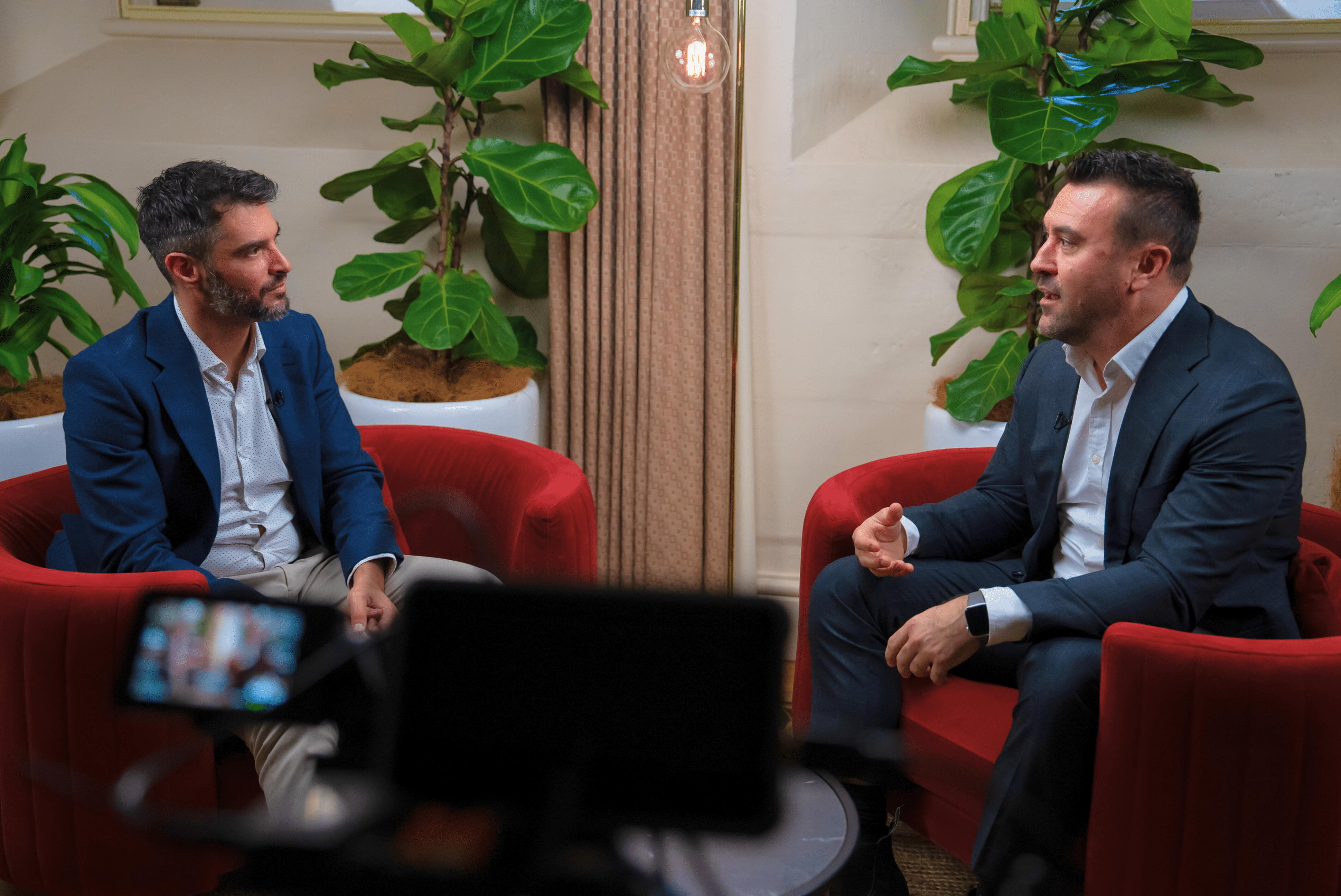Glenn Gore on How to Take the First Mover Advantage
Amazon Web Services’ former Chief Architect Glenn Gore discusses the creation of hybrid customer experiences, taking first-mover advantages with emerging technologies, and key learnings from innovations within the financial and pharmaceutical industry.Amazon Web Services’ former Chief Architect, Glenn Gore, is no stranger to creating architectural best practices to leverage cloud to innovate and disrupt new markets.
When asked how business leaders should navigate through the changing technology landscape, Glenn spoke about the creation of hybrid customer experiences, taking first-mover advantages with emerging technologies, and key learnings from innovations within the financial and pharmaceutical industry.
At ADAPT’s CCDC Edge event, he also discusses with ADAPT’s Senior Research Strategist, Aparna Sundararajan, what executives can do today to foster a culture of innovation.
Aparna Sundararajan:
Today, I just wanted to step back and see what life would look like for us in the next 10 years because last year in 2019, before COVID, we all were thinking that this decade will change the way we live.
We did not know that a virus will change that, but I just wanted to understand how you see it shaping up and evolving?
Glenn Gore:
Now look, it’s going to be very different to anything that we’ve expected. A lot of that’s been driven by the events of 2020, which in some ways you could argue has been one of the biggest social experiments of all time.
But as devastating as the impact has been of COVID, I do think it’s also a catalyst for innovation. You’ve seen fundamental changes to how customer experience works, for example, where people realised pure digital experiences are far better.
As we start to emerge out of lockdown and shutting the world’s borders down, you start now hearing much more positive talk about travel around the world and economies opening up.
It’s going to be fascinating just to see how do you start blending these two experiences?
How do you blend the untapped demand there for people who are craving human to human contact?”
But with the efficiency and the ease of pure digital, it’s just going to drive a whole series of new interactions. Our whole of technologies hasn’t stopped evolving in the background over the last 12 to 18 months.
Aparna Sundararajan:
Wow, that’s a good point, the technology point, because I feel like many of us live in this whole denial of technology evolution.
We believe that it will take longer, especially even if I talk about AI, we’re expecting it to work like how it’s shown in the movies, but it’s already doing many things that we don’t realise.
What technologies do you think are being underrated or overlooked by organisations at large today?
Glenn Gore:
That’s a great question, Aparna, and there’s part of me that wants to say all of them. We do a bad job of just understanding the impact that new technologies can have.
What’s hard for executive leaders is knowing when the right time is to invest and adopt those technologies. You want to be adopting them early enough so you can maybe get that first-mover advantage.
But there’s the risk with that, what if you pick the wrong one? That’s just the cost of being an innovative business this time.
You’ve got to look at how you can have a few bets on technologies you think will impact you.”
What if some of them don’t pay off? How do you minimise that cost and risk to as least as possible?
Because even if they fail, they’re giving you insights that allow you to fail fast and fail forward to the technologies that will make it through.
If we look at who is able to adapt the quickest during the shutdown through the businesses, it was those that already had as part of their culture a high degree of innovation and digital native thinking within the organisation.”
Those customers and organisations stuck more within that traditional thinking had a high technical debt that struggled the most.
Not only did they have to do with a shutdown of a business or a completely changed environment for them, but they also had to go through a huge technology migration and adaptation so they could use technologies that allowed them to work in what was now a pure digital play.
They had to do two major things at the same time, that’s difficult.

Aparna Sundararajan:
From a cost perspective, there should always be a cushion or a fund that’s set up for proof-of-concept projects so that you keep looking and exploring.
But we’re still struggling with IT being considered a cost centre, and CIOs are still struggling to get funding and demonstrate the ROI.
Who is doing it right? I almost feel like there should be some learning from research and development in traditional companies. Maybe the pharmaceutical industry, how do they do it?
Glenn Gore:
There are patterns of doing better than others, and you can break it down even to industries.
The financial services sector, particularly the banks, think they’ve realised the future is based on technology. You look at just their adaption, for example, of emerging technologies, such as blockchain technology and how they’re building that directly into some of their core banking systems, settlement services, even playing around with some of the cryptocurrencies which lie on top of blockchain itself.
Who knows where it’ll go, but the fact is that they’re building expertise and experience within their businesses so that when this does become more mainstream, they will be ready to take advantage of that.
That’s the key thing, you‘ve got to be investing just ahead of that curve a little bit.”
Our pharmaceutical industry was another example you just mentioned, which has done a good job of looking at cutting edge, high-performance computing, cloud-based services to do things like chemical compound analysis and Monte Carlo simulations.
With AI, we realised that medicines heading towards more personalised medicine, better testing, more rapid turnarounds, more detailed medical research to the power of big data analytics, where they realise they have big data samples of patient data.
But are they extracting as much information as they can, for example? They were early adopters of some of this technology, but every industry and every company sometimes struggle.
I get asked this question. “Is there a company that doesn’t benefit from innovation?” I haven’t been able to come up with one yet.”
Aparna Sundararajan:
I’d be interested to see how companies move forward in this decade, but I also feel that there is a culture change or this thinking at an individual level that needs to change.
You and I spoke about it at our panel at the CCDC conference. I wanted to touch upon a little more on what you think people should stop doing and start doing to move towards this phase?
Glenn Gore:
What can people stop doing? Stop finding reasons not to do things.”
I find it fascinating but frustrating where sometimes I talk to other businesses, and all I hear is why they can’t do anything. They often want to push back on some of those individuals, and I’m pretty sure your company isn’t paying you to find reasons to say no.
The definition of innovation is its change that improves. Our job often is to be the pragmatist and find out which technologies are evolving? Which ones can I take advantage of now?”
Some of the concepts we talk about have been around for a decade.
In software development, there’s still excitement around not all software development teams run as true agile software development. But some of the principles of agile programming, if you look at the history, go back to the 1970s.
It’s not a new concept, but what we were missing were the tools. Again, you have to separate in the innovation process because it’s good to have big visions and big dreams and everything.
I think of people like Elon Musk with Space X, for example, where he has that incredibly big dream of getting humans on Mars; he stated that he’s putting out the money in 2026. It’s not that far away. But does he have all the technologies and tools right now to achieve it?
No, he doesn’t, but he’s betting on the fact that his pace of innovation will get him there in the next five years.
You’ve got to have those bold visions and use them to drive and focus the innovation on filling up all the missing gaps.”
I’m a big fan of the quote from Isaac Newton. We stand on the shoulders of giants in that you’ve got to solve all the little incremental problems before achieving the big results you come up with.

Aparna Sundararajan:
That reminds me of John McCarthy, the Father of AI, and he started the whole conversation around AI. But he said it’d take 200 years, but if it’s done earlier, well and good, but at least 200 years.
There’s this reality check that all these people understand that you still have to start no matter how long it takes and its delayed gratification, and that’s one thing too for organisations to adopt.
Glenn Gore:
You need to be patient through this, it does take time, but you have to start somewhere, and it’s often the hardest step is how do you get approval.”
How do you create space within an organisation of resources on something that you’re not confident of?
You may not even be able to articulate what the real result is, but you know it’s a technology area that will impact your organisation.
Aparna Sundararajan:
That’s been a great interaction Glenn, and I’m looking forward to your keynote at Digital Edge. Before we go, what are the things that you’re most incredibly excited about in 2021?
Glenn Gore:
Getting on a plane.
2021 I’m most excited by lots of things. As the world does open up, being able to visit family and travel the world is something that I miss, sharing insights into technology. But I’m also excited about medical research.
There’s been so much focus on just the COVID vaccine but look beyond that. If you realise just how much medical science has accelerated over the last year, it’s incredible.
We’re going to see once we get the world vaccinated what you see around mRNA and others being used to solve other viruses. For example, this is just the tip of an iceberg. I can’t wait to see how that evolves.
Aparna Sundararajan:
That’s great. Then we hope to see you in Australia sometime and at an ADAPT event.
Glenn Gore:
Fingers crossed, maybe even the next event.
Aparna Sundararajan:
Great. Thank you so much for the conversation. This was incredible.
Glenn Gore:
Thank you, Aparna.





























